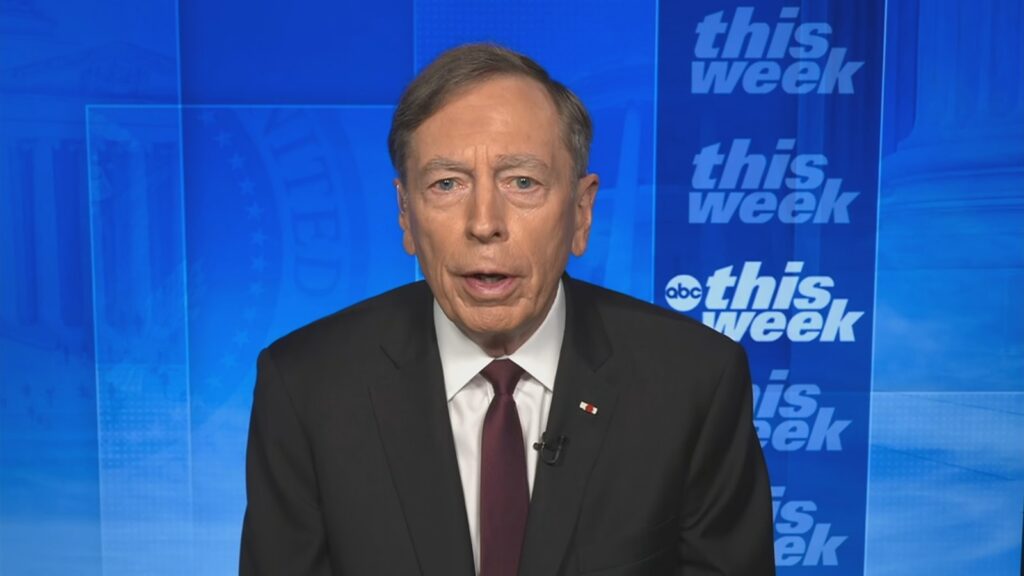Former CIA Director and retired Army Gen. David Petraeus said Sunday that he’s dubious that Russian President Vladimir Putin and Ukrainian President Volodymyr Zelenskyy will meet to discuss ending the war in Ukraine.
“There’s not that much right now that would lead us to believe that,” Petraeus told ABC News’ “This Week” co-anchor Jonathan Karl. “I don’t think, in fact, out of the last two weeks, really, Jonathan, I think what should be clear to all, and I think it is even clear to President Trump, is that despite all of his efforts, again, which we applaud to end the war, to stop the killing, Vladimir Putin clearly has no intention of doing that unless he’s given additional territory, which is heavily fortified, and Russian forces would have to fight for years at the pace that they’re going.”
Petraeus’ comments come after Ukrainian President Volodymyr Zelenskyy met with President Trump last week in Washington alongside a contingent of other European leaders in pursuit of gathering more support to broker a ceasefire between Russia and Ukraine.
Ukraine’s air force said Russia launched 72 drones and one Iskander-M ballistic missile into the country in its latest overnight barrage, of which 48 drones were intercepted or suppressed, as the country marked the anniversary of its 1991 declaration of independence from the Soviet Union. Ukraine continued its own long-range attacks on Russia overnight, according to Russia’s Defense Ministry, which said it shot down 95 Ukrainian drones over 14 regions during the latest exchange.
Former CIA Director and retired Army Gen. David Petraeus appears on ABC News’ “This Week” on Aug. 24, 2025.
ABC News
Petraeus said that currently the “obstacle to peace” is Putin. He says that the U.S. should reconsider restrictions on some weapons that it won’t send to Ukraine and send more aid to ultimately bring an end to the 3 1/2-year war.
“And what we need to do is change those dynamics by helping Ukraine far more than we have so far. Lifting restrictions on them, seizing the $300 billion of frozen reserves and European countries of Russian money, giving it to Ukraine. More sanctions on Russia, even including the Gazprom bank, and curtailing the export of oil further than we have already,” Petraeus said.
Petraeus referred to a Wall Street Journal report that the Pentagon is limiting Ukraine’s use of U.S.-made long-range missiles against targets in Russia.
“This is another case where it appears that the Pentagon is carrying out policies that conflict with President Trump’s inclination. Now, I can understand why they would limit the use of certain long-range systems against Russia when they think that Russia might still be willing to make a deal. But that should be very clear not to be the case, at this moment, and I hope that there will be a review of that policy,” Petraeus said.
Nonetheless, Petraeus said he knows the war cannot last forever, saying that the war so far has killed and wounded 1.06 million Russians, including more than 500,000 that haven’t been able to return to the front lines due to the severity of their injuries, and is also having a “very substantial impact” on its civilian workforce.
“This has to have, over time, a very, very substantial impact on the ability of Russia just to find a civilian workforce as well. In fact, it’s reported that they were actually looking in Africa for women who can actually replace some of the men in Russia, in various industries,” Petraeus said.
Petraeus also responded Sunday to the Trump administration either firing or reassigning 16 top military officers, seven of whom are women, thus far into his second term. The latest removals happened Friday, including the head of the Defense Intelligence Agency, Lt. Gen. Jeffrey Kruse, just weeks after he oversaw a preliminary report that contradicted Trump’s assertion that Iran’s nuclear sites were obliterated by U.S. strikes in June.
“I think it has to be a concern. Obviously, it’s unprecedented. There’s never been anything like this,” Petraeus said. “There have been cases in the past where individuals who’ve gotten crosswise with the president or with the secretary of defense certainly, usually on a policy issue in which they should not have spoken out and indeed were replaced. But the numbers here obviously are much more significant than that.”

